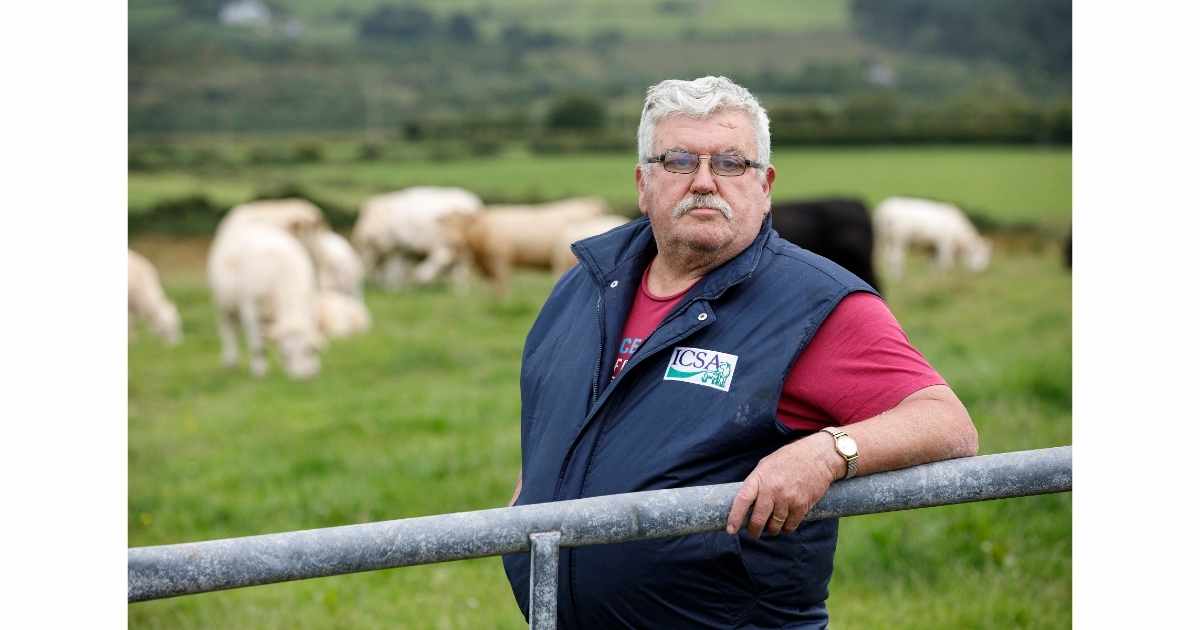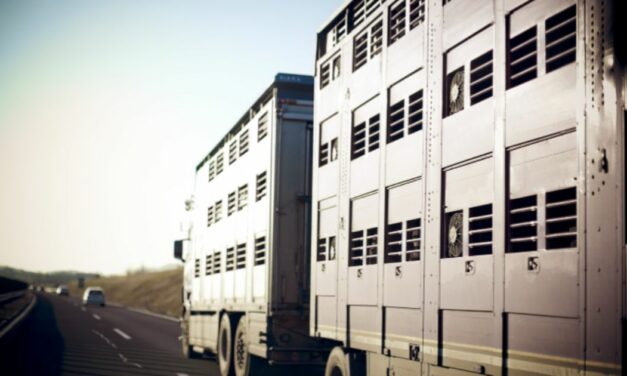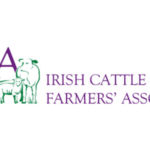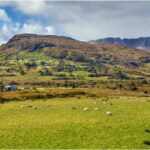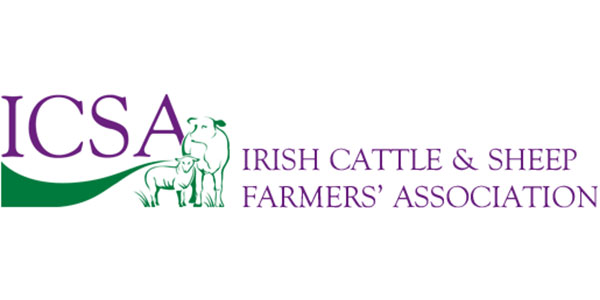1 SEPTEMBER 2021
ICSA president Dermot Kelleher has said ICSA wants more payments directed at productive agriculture by maximising the use of every possible avenue within the CAP framework. “The ICSA objective is to bring CAP payments back home to the active but low-income sectors of beef, sucklers, sheep and tillage which is where direct payments were originally concentrated. This is only fair given that these are the sectors which are most dependent on direct payments for income with the 2020 Teagasc National Farm Survey preliminary results showing that suckler farmers depend on subsidies for 157% of their income for example.”
Announcing the association’s CAP policy, following National Executive ratification, Mr Kelleher explained that ICSA was calling for the full use of the 13% coupled payment option to deliver a variable, coupled premiums that would deliver an extra payment on suckler cows and ewes. On current cow numbers it would add €120/cow for the first 40 cows, and we believe that the BDGP and BEEP payment value can also be increased to deliver an overall total of €300 on the first 40 cows, and €180 thereafter. Mr Kelleher said that the association had devised a method to avoid quotas and capping on the suckler herd. “In the unlikely event that suckler cow numbers increased nationally, there would be a percentage linear cut on the payment.
Similarly, we are proposing that the coupled option could also deliver €16/ewe on the first 250 ewes and we will be seeking a total payment of €35/ewe on the first 250 (adding in the Sheep Welfare Scheme) and €19/ewe thereafter, again with no quotas or capping.
ICSA is arguing that because the suckler variable payment is front-loaded on the first 40 cows and the sheep scheme on the first 250 ewes, it is equivalent in effect to CRISS, particularly as these are low-income sectors. “We believe that this will allow Ireland to scrap the CRISS which is a very inefficient way of targeting supports to those that need them most.”
ICSA is also proposing a beef carbon efficiency payment worth €70-100/head on up to 150 animals for farmers who undertake a programme designed to deliver more efficient, earlier slaughter of steers, heifers, and bulls, and will involve weighing, dung samples and a target to finish cattle at under 28 months for steers, under 26 months for heifers and under 20 months for young bulls, with higher payments the younger they are finished.
In keeping with the EU Green Deal objectives, ICSA is also seeking a much more ambitious Agri-Environment scheme which, by adding in the carbon tax €150 million promised in the Programme for Government, can lead to a scheme for almost 40,000 farmers with a maximum payment of €15,000 and an average payment of close to €10,000. “The time for rhetoric around the environment has passed; it is now time to put the money up or shut up,” said Mr Kelleher.
Mr Kelleher said that while many groups have been vociferous with their shopping lists, it is now time for honest policy making with proposals that stack up. “ICSA’s CAP submission is fully costed, technically feasible under the EU regulations and delivers on meeting the EU Commission’s objectives which is vital to getting approval from Brussels. Moreover, it draws on the Ag Climatise national strategy and it will give hope back to the less intensive, more environmentally balanced cattle, sheep and tillage systems.”
“ICSA will not tolerate any plan to link any CAP payment whatsoever to Bord Bia Quality Assurance. CAP is about supporting farmers; it is not about subsidising marketing for factories.”
Mr Kelleher finished by saying that the association would be meeting Minister McConalogue on CAP reform in the coming days.
Key ICSA CAP proposals include:
€300/hd per suckler cow
A suckler cow variable premium worth around €120/cow calved in addition to BDGP/BEEP type scheme, which can in total deliver €300 per suckler cow.
Cost: 9.3% deduction from everybody’s per hectare payment (e.g., €23/ha from a payment which would otherwise be €250).
This means an annual €110 million fund in Pillar 1, which like the protein payment, would vary up or down according to the numbers of cows calved. At 900,000 suckler calves registered, it would mean €122/head. However, it would be capped at 40 cows (as an alternative to CRISS) and this would potentially mean a little more per head. If cow numbers drop, the payment goes up. ICSA is also proposing an early retirement scheme for suckler farmers which would allow leeway for younger farmers to grow their suckler herd and still keep payment rates high. This would also keep the focus off suckler cows in terms of national emissions.
€35/hd per breeding ewe
A ewe variable coupled premium worth around €16/ewe (first 250) in addition to a better Sheep Welfare & Efficiency Scheme, worth €19/ewe. The sheep scheme would include a payment of €5/ewe for proper presentation of wool, including rolling fleeces.
Cost: 3.7% deduction from everybody’s per hectare payment (e.g., €9.25/ha from a payment which would otherwise be €250).
€15,000 Agri-Environment Scheme
A single, menu-based scheme that can deliver a payment of up to €15,000, with an average payment of €10,000, based on the participation of 38,000 farmers.
€100/head beef carbon efficiency payment
Beef carbon efficiency payment worth up to €100/head for feeding animals between 12-24 months. Payment requires weighing once, dung sampling and one day training. Animals can be suckler or dairy born but not female dairy breeds. Animals must be held by participating farmer for in excess of 100 days and the weighing must be completed not less than 100 days before slaughter. This element will attract a payment of €40/head.
Final payment is a voluntary payment for early finishing of animals according to the following schedule.
| Slaughter deadline | Heifers | Steers | Bulls |
| €60 | 22 months | 24 months | 16 months |
| €50 | 24 months | 26 months | 18 months |
| €30 | 26 months | 28 months | 20 months |
If the animal is sold direct to the factory, the payment is automatic. If the animal is sold in the mart, the participating farmer who sold the animal in the mart will still receive the payment provided the animal is slaughtered within 30 days. If the animal is slaughtered after 30 days, it will not be eligible for a payment either for the vendor or the purchaser.
The focus on weighing, dung sampling and earlier, more efficient finishing is fully in keeping with the Ag Climatise strategy and emissions targets. This would be funded within Pillar 2 as a carbon measure, in keeping with the EU objectives, and the funds would be sourced by transferring €80 million from Pillar 1.
Cost: 6.7% deduction from everybody’s per hectare payment (e.g., €17/ha from payment which would otherwise be €250/ha) (To be transferred from Pillar 1 to Pillar 2)
Focus on supporting active farmers
ICSA is fighting the case for active farmers engaged in producing food, and whom have a minimum stocking rate. ICSA proposes that there should be a minimum stocking rate to qualify for the eco-scheme (or crops). We are also seeking an end to infinite leasing out of entitlements by proposing a five-year maximum.
Young farmers and intergenerational transfer
ICSA is proposing a 25% top-up for suckler cows to a maximum 40 cows (about €30 + €120), for up to five years under the variable suckler cow payment; a 25% top-up for ewes to a maximum 250 ewes (about €4 + €16 for up to five years); a 25% top-up per hectare for up to five years; access to TAMS grants at a rate of 60%; an early retirement scheme for those aged 55 and over amounting to €100/cow for 5 years in order that young farmers can expand suckler herds.
Fairness for lower income sectors
ICSA believes that CAP payments must pivot towards those farmers who rely on CAP payments the most. It was to support these very farmers – in the lower income cattle, sheep, and tillage sectors – that CAP was established in the first place, and it is the place to which it must now return.
Delivering on green agenda
ICSA CAP policy meets the objectives of the EU and delivers on the EU climate agenda. ICSA believes that the eco-scheme should be more focused on less intensive farmers and that derogation farmers should not be prioritised for either eco-scheme or ANC payments.
No capping on suckler herd
ICSA will not agree to any restrictions on the number of suckler cows a farmer can keep. As we see a substantial increase in the number of dairy herds growing into hundreds of cows, it is unacceptable that the problems around dairy expansion would lead to punishing suckler farmers when the average suckler herd is less than 20 cows, and suckler herds of more than 100 cows are almost unheard of.
Opposed to membership of Bord Bia Quality Assurance Scheme being linked to CAP payment
ICSA believes that if every farmer is a member of a quality assurance scheme, then no farmer would be able to achieve a bonus.
Mr Kelleher said, “Irish farmers have been dealt a lousy hand of cards as the overall CAP budget is no longer fit for purpose. However, in addressing the reality of the situation, ICSA has delivered a CAP policy which is technically feasible under the regulations and addresses the objectives that the EU has set out. It is also fully costed and achievable provided the Government follows through on their commitment of €150m in carbon tax.”
Capton: ICSA president Dermot Kelleher pictured on his farm in Inchigeela, west Cork.
ENDS

